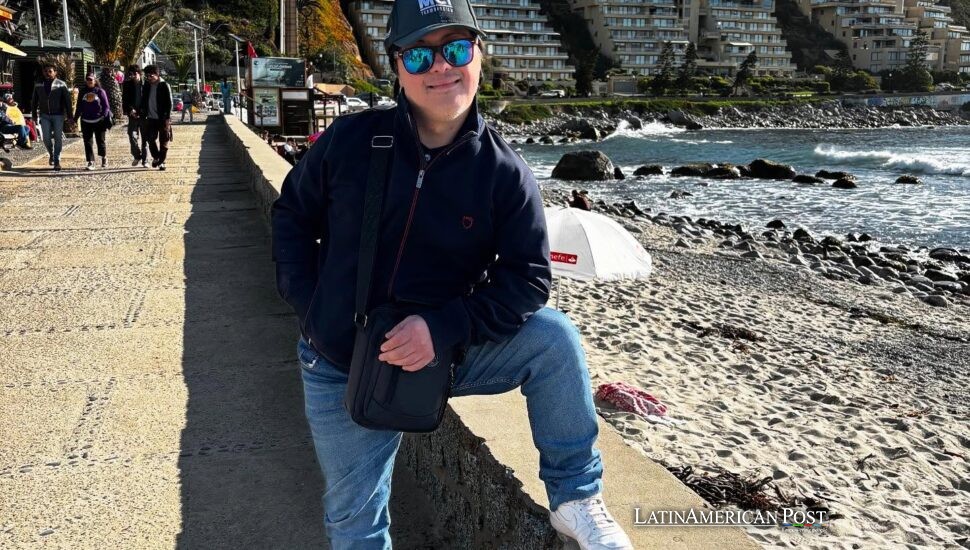Chile Welcomes an Unexpected Contender as A Beloved Actor with Down Syndrome Seeks the Presidency

Chile’s presidential race, shaped by bitter extremes, suddenly has a new voice. Sebastián Solorza, a 43-year-old actor with Down syndrome and a national following, is fighting to collect signatures to run as an independent—offering empathy, balance, and inclusion in a divided nation.
Between extremes, a campaign built on listening
Sebastián Solorza is a household name in Chile. His face appears on television screens, in magazine spreads, and on Netflix, where he starred in the acclaimed thriller Chromosome 21. He has collected national acting awards, greeted fans on daytime talk shows, and carved out a career that blends warmth with determination.
Now, he is stepping into a very different spotlight. Solorza wants to be president—an independent candidate promising to be a “point of balance” in a political arena defined by shouting from the far right and the far left.
“I listen with my heart,” he told AP, explaining that living with Down syndrome has taught him to value empathy above volume. His proposed platform focuses on inclusion, stronger healthcare and education, and safer streets—issues he presents not as partisan trophies but as everyday needs.
The stakes are high and the clock is relentless. Chile votes on November 16. If no candidate wins outright, the country heads to a December runoff. For months, the race has been a cage match between José Antonio Kast, the far-right leader who lost in 2021, and Jeannette Jara, the Communist nominee backed by the ruling coalition. Solorza’s message aims to cut through the rancor: equality, opportunity, and a softer voice in a nation that has grown used to shouting.
On the sidewalk trail, fame meets the grind
Celebrity may open doors, but in Chilean politics, it does not replace signatures. To qualify, Solorza must gather 35,000 notarized supporters by August 18. As of now, he has just over 600. The math is unforgiving.
That does not stop him. On the streets of Huechuraba, where he is a familiar face in cafés, Solorza’s pace is slow because he cannot walk far without interruption. Baristas reach out for hugs. Teenagers ask for selfies. Delivery drivers recognize him from Chromosome 21. Each encounter doubles as persuasion and proof: he belongs here, among voters, asking for their backing.
In Valparaíso, supporters gather on the steps of Parliament to wish him well. “Let it be the people who decide our future,” one man tells him. Between shifts at his day job in construction and late nights filming or attending events, Solorza meets with lawmakers, visits disability associations, and knocks on doors. Exhaustion shadows him, but he frames the effort itself as victory.
“My candidacy opens a door,” he told AP, “for people with Down syndrome, for people with disabilities, to raise our voices.” Carolina Gallardo, director of the Down Up Foundation, agrees. His campaign, she says, “demystifies myths and prejudices still present in society” and redefines who can stand at the center of public life.
Raised by music, propelled by television
Solorza’s journey began in modest rooms filled with uncertainty. Born in the 1980s, he grew up in an era when information about Down syndrome was scarce, and stigma was everywhere. Doctors gave his mother, Jenny, no clear answers. “Those years were very dark,” she recalled. The family turned to music as a lifeline, encouraging him to sing, drum, and perform.
Performance became his compass. In special schools, he gravitated to stages rather than textbooks, seizing every chance to act. At eighteen, he won a scholarship to a theater program. Years of persistence followed: stage roles, variety shows, and interviews where his humor and presence captivated audiences.
Then came the breakthrough. In 2022, he played Tomy in Chromosome 21, a gripping drama about a detective unraveling whether a young man with Down syndrome was a witness or suspect in a killing. The show soared to Netflix’s top charts within days. A year later, Solorza was named Best New Actor at the Caleuche Awards, cementing his place in Chile’s cultural firmament.
Politics, however, welcomed him with sharper edges. Critics online dismiss him as unprepared. Others scoff at the idea of an actor without party backing. He shrugs. “I know my candidacy is uncomfortable for many,” he told AP. “But I am here to support minorities.”
For him, the campaign itself is the point: each handshake, each meeting, each public conversation chips away at the prejudices he has confronted his entire life.
A long shot that shifts what’s possible
Even his closest allies admit the obvious: gathering 35,000 signatures in weeks is a daunting climb. Polls suggest Chile remains locked in the familiar standoff between Kast and Jara, fed by polarization and fears over crime. Solorza’s numbers are small. His odds are long.
But his candidacy has already unsettled the script. By walking the streets with a clipboard, he is asking Chileans to imagine a presidency defined not by ideology but by empathy. He insists safety, education, and health are shared commitments, not partisan weapons. His voice is quiet, but his message presses directly against the nation’s rawest divides.
“I listen with my heart,” he repeats, and Chileans pause to listen back. Whether in a café, outside Parliament, or on a busy Santiago street, he shifts conversations from conflict to possibility.
The test before him is not a televised debate or a party primary. It is a deadline and a stack of paper. If he falls short, Solorza vows to treat every signature as a real vote for inclusion and continue building space for disability rights. If he qualifies, the nation will confront a candidate who has already forced it to consider new definitions of citizenship and representation.
Also Read: A Reporter’s Fatal Quest Reshapes How We Imagine the Amazon Today
Either way, Sebastián Solorza has already expanded the imagination of Chilean politics. From a boy who found freedom in music, to an actor who lit up Netflix, to a man now standing on sidewalks asking strangers for trust—his life itself is the argument.
“We all deserve the same opportunities,” he told AP. “And I have spent my life proving it”





